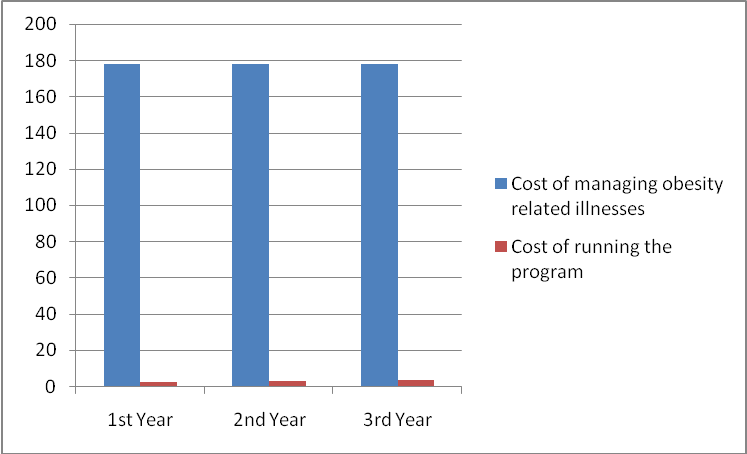Program for Weight Management
The inexplicable weight gain among college students has become a great challenge not only to the students but to the entire healthcare system. To overcome the challenge, a program that is aimed at creating awareness about healthy eating among the freshmen will be created. The name of the program will be “Gain to Lose”. In this program, the students will gain points for every healthy meal they eat. A chart will be provided to the students so that whenever they eat meals that are categorized as healthy, they tick and award themselves points. Secondly, if they engage in physical exercise they double the points earned on healthy meals. The charts will then be submitted on a weekly basis to a program coordinator who will compute the points to determine the top gainers. Each Sunday afternoon, a party will be organized for the top gainers.
According to de Vos et al. (2015), first-year students eat junk foods and do not engage in exercise. Therefore, the program is supposed to make the students more responsible for choosing the right foods and exercising regularly. Over time, this will become a habit and hence lasting healthy lifestyles. The program will be successful because it incorporates social and behavioral aspects of the intervention. For example, young people want to have fun; hence, many students will want to be on a list for the evening parties on Sundays. In addition, the program is unique and regularizes a healthy lifestyle. It will also have a riffling effect where students decide to choose healthy meals because their peers are doing so. Most of the programs that have been implemented to address the challenge of the weight among students lack the social aspect. In most cases, the programs produce positive results in the first days of implementation. However, with time there is high attrition.
The coordinator of the program will be a clinical nutritionist. She will be based on the premises of the colleges. The program will start as the first semester begins for the freshmen and run for three years. After the program is implemented, it is expected that there will be behavioral change, good management of weight, and an increase in the number of students engaging in physical exercises.
Benefits of the Program
According to Holmes and Mason (2014), 5.2 million college students in the US today are considered overweight. This presents a health challenge to the entire healthcare system in the US (Harring, Montgomery & Hardin, 2010); thus, the investment in the program to reduce the numbers will be worthwhile. The combination of a sedentary lifestyle and unhealthy diet results in excess weight and obesity. Increased awareness is necessary to enable college students to make the right choices. Therefore, a program that is based on the likes of the students will lead to a culture of healthy habits.
It is estimated that the costs for the management of obesity-related illnesses range from $147 to $210 billion annually. This is very expensive compared to $ 2 billion that will be required to run the “Gain to Lose” program each year. Each year the cost of the project is projected to increase by 25% due to new enrollments. This amount will cover the purchase of weighing scales, salaries, charts, campaigning, weekly parties, transport, and communication.

Conclusion
The epidemic of obesity has caused serious health consequences to the health system. The cost implication for weight management is very high. The issue of weight management in colleges should be approached by applying strategies that take into consideration the lifestyles of the students. The social aspects play a critical role in enhancing the feasibility of the weight management programs and create a culture of a healthy lifestyle for the students as they transition to adulthood. Therefore, strategies that change the behaviors of the students can result in reducing the health burden brought about by excess weight and obesity.
References
de Vos, P., Hanck, C., Neisingh, M., Prak, D., Groen, H., & Faas, M. M. (2015). Weight gain in freshman college students and perceived health. Preventive Medicine Reports, 2(1), 229-234.
Harring, H. A., Montgomery, K., & Hardin, J. (2010). Perceptions of body weight, weight management strategies, and depressive symptoms among US college students. Journal of American College Health, 59(1), 43-50.
Holmes, W. B., & Mason, R. (2014). Obesity and the College Dining Commons. Journal of Applied Economics & Policy, 32(1), 26.